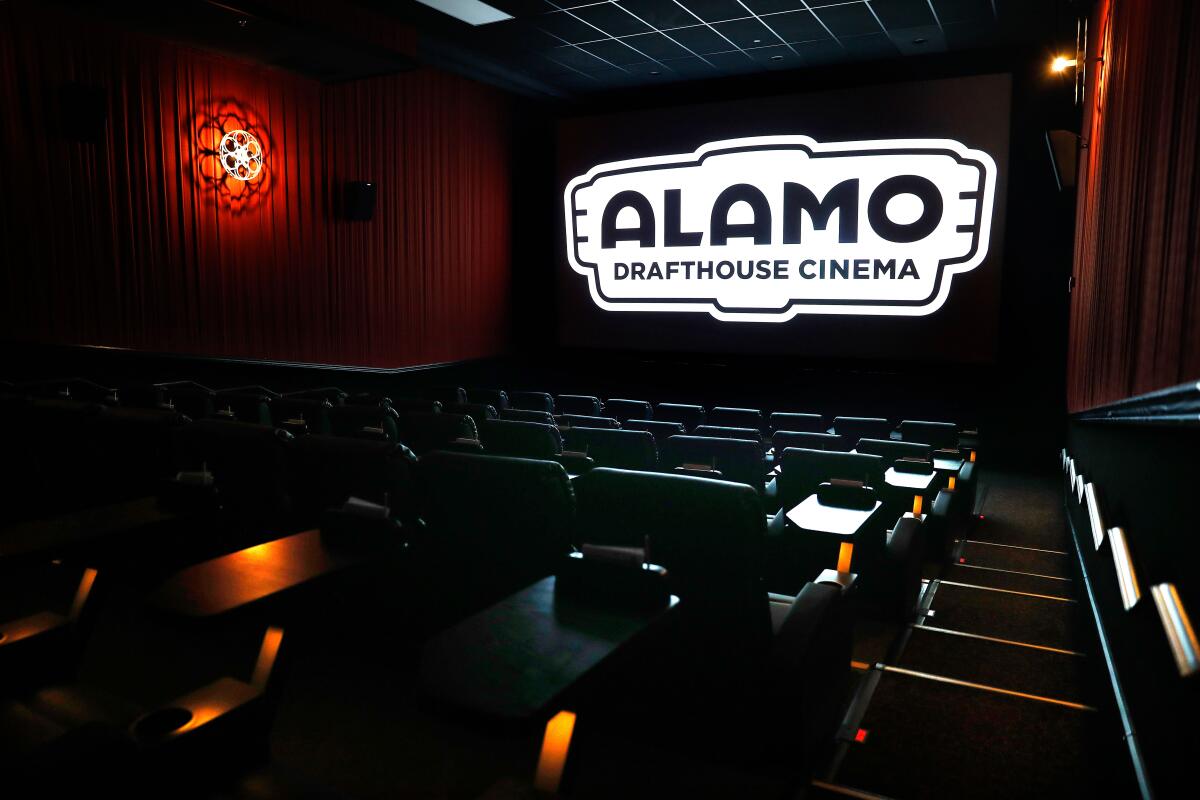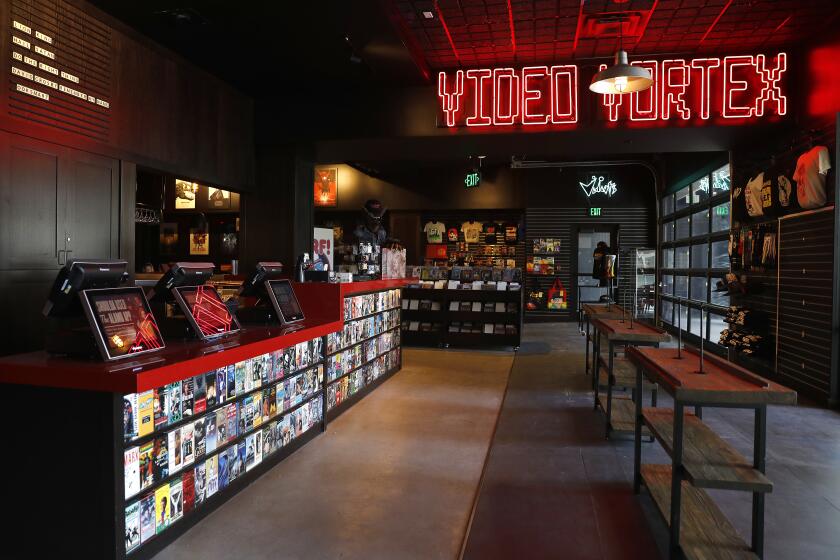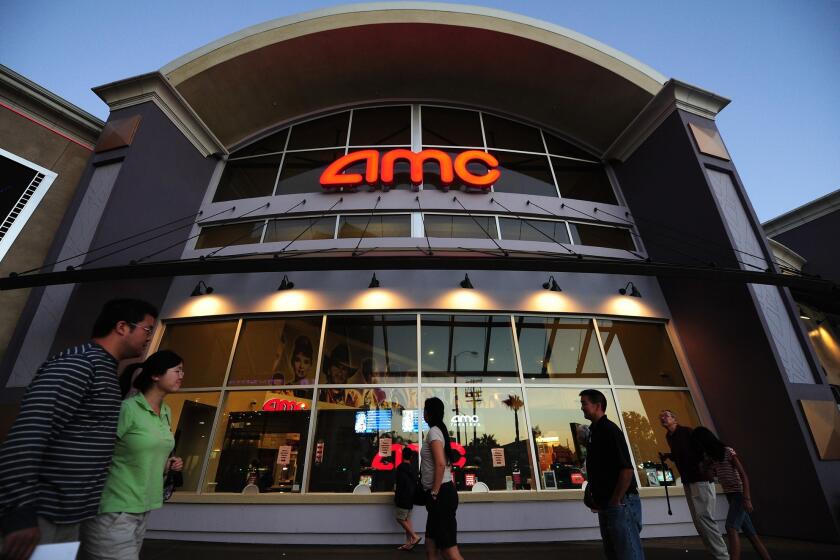Sony Pictures buys dine-in movie theater chain Alamo Drafthouse

Sony Pictures Entertainment has purchased Alamo Drafthouse Cinema, the innovative dine-in movie theater chain known as a prime cinephile destination, including at its location in downtown Los Angeles.
The Culver City-based studio said Wednesday that the quirky, Austin, Texas-based exhibition company would be housed under its newly established Sony Pictures Experiences division, helmed by Alamo Drafthouse’s Michael Kustermann.
Kustermann will continue his role as chief executive of the cinema chain.
Sony did not disclose the price of the deal but promised to “preserve Alamo Drafthouse’s distinctive movie-dining experience.” The exhibitor — which boasts 35 locations in major U.S. cities, including Los Angeles, San Francisco, Chicago, Boston, Austin and New York — is known for serving food and craft beer at its theaters.
It’s also famed for its strict no-texting policy and its special screenings, which have made it a haven for film buffs. The chain regularly hosts themed “movie parties” inspired by certain titles. (Upcoming movie-party screenings at the Los Angeles venue include 2007’s “Hot Fuzz,” 1984’s “Purple Rain” and 1939’s “The Wizard of Oz.”)
“Alamo Drafthouse’s differentiated movie-going experience, admired brand and devoted community fit well with this vision,” Ravi Ahuja, president and chief operating officer of Sony Pictures Entertainment, said in a statement. “We look forward to building upon the innovations that have made Alamo Drafthouse successful and will, of course, continue to welcome content from all studios and distributors.”
The Austin, Texas-based chain opens its first venue in Los Angeles and looks to find its own place in the local community of movie fans.
Alamo Drafthouse says it is the seventh-largest theater chain in North America. In a limited sense, Sony’s acquisition of Alamo is a flashback to Hollywood’s Golden Age, when the major studios also owned and operated their own theater chains, thereby controlling production, distribution and exhibition.
This vertical integration system triggered a major antitrust case that resulted in a 1948 U.S. Supreme Court decision that effectively broke up the studio oligopolies. In a series of settlements known as the Paramount decrees, the studios agreed to divest their theater assets.
During the Trump administration, however, the Justice Department sunset the decrees, determining them to be out of date.
Sony’s acquisition of Alamo Drafthouse has, unsurprisingly, ignited discourse online, with some suggesting that the movie business is on a slippery slope that is looking increasingly vertical.
“Perhaps that comparison could be brought into play,” said Shelleen Greene, professor of cinema and media studies at UCLA. “But it’s also a very different moment. ... This is another sign of acclimating to a shift in theater-going practice, in viewership, in the ongoing adjustment to streaming services.”
Greene views this moment not so much as a signal of a return to vertical integration, but another effort by studios to increase cinema attendance, “reimaigine the theater-going experience” and stay relevant.
“Alamo is a different kind of exhibition space,” Greene said. “It’s not passive theater-viewing. ... That’s what Sony is looking for in the future.”
Alamo Drafthouse, the maverick cinema chain known for its beer and food service, is set to finally open its long-awaited downtown Los Angeles location next month.
Today, entertainment companies control production, distribution and exhibition in a different sense: Most of the major studios’ parent companies own streaming services. Sony is the only top studio without a mass-market streamer to compete with Netflix, though it offers some niche direct-to-consumer services, including anime outlet Crunchyroll.
Restrictions on studios owning theaters thawed in the decades after the decrees as studios started to dip their toes in the exhibition space.
Sony for a time owned the Loews theater chain, which is now part of AMC. Paramount Pictures and Warner Bros. owned the Mann theater chain for many years.
Disney has long operated Hollywood Boulevard’s El Capitan, where it screens its movies and hosts special events. Netflix acquired the famed Egyptian Theatre on Hollywood Boulevard from American Cinematheque, as well as the Bay Theater in Pacific Palisades, where it also screens its own movies.
In recent years, the line between exhibition and distribution has become increasingly blurred, with major exhibitors such as AMC Theatres releasing titles directly into their own cinemas. After “Taylor Swift: The Eras Tour” ranked among the highest-grossing films of 2023, AMC has indicated that it intends to dip its toes further into the distribution pool going forward.
“What were before more bounded categories ... are now becoming much more fluid,” Greene said. “It’s a period of experimentation.”
The so-called Paramount decrees have governed film distribution and exhibition for decades. The Justice Department views them as out of date.
For the record:
12:38 p.m. June 12, 2024A previous version of this post incorrectly stated that the Los Angeles Alamo Drafthouse location was the exhibitor’s only California theater.
Under Sony, Alamo Drafthouse will keep all of its existing locations, including its only theater in Southern California, which opened in downtown Los Angeles in 2019.
The studio acquired the exhibitor from private equity firms Altamont Capital Partners, Fortress Investment Group and founder Tim League, who launched Alamo Drafthouse with a single-screen Austin repertory theater with his wife, Karrie, in 1997.
Like many theater operators, Alamo Drafthouse struggled in the wake of the COVID-19 pandemic, which shuttered cinemas for months. The company filed for Chapter 11 bankruptcy protection in 2021, citing pandemic-related woes.
It emerged from bankruptcy under the ownership of a group of senior creditors, which included Altamont and Fortress.
Movie theater chains continue to face challenges as the box office struggles to mount a comeback from the pandemic. So far this year, ticket sales in the U.S. and Canada are down 26% from the same period in 2023, according to Comscore.
“We are excited to make history with Sony Pictures Entertainment and have found the right home and partner for Alamo Drafthouse Cinema,” Kustermann said in a statement. “We were created by film lovers for film lovers. We know how important this is to Sony, and it serves as further evidence of their commitment to the theatrical experience.”
A handful Alamo Drafthouse franchise locations recently closed in the Dallas-Forth Worth area, citing poor box office.
More to Read
Inside the business of entertainment
The Wide Shot brings you news, analysis and insights on everything from streaming wars to production — and what it all means for the future.
You may occasionally receive promotional content from the Los Angeles Times.














